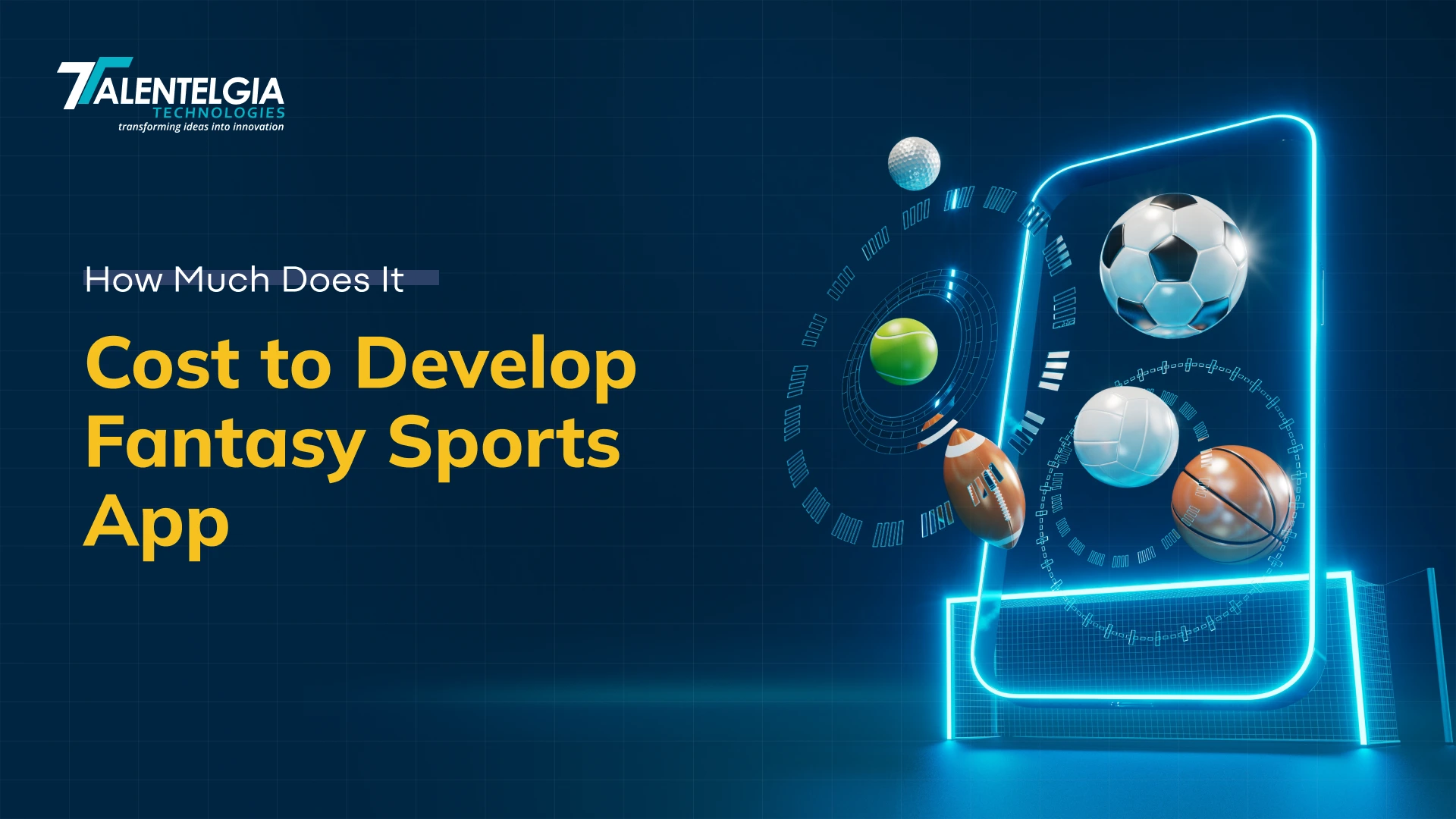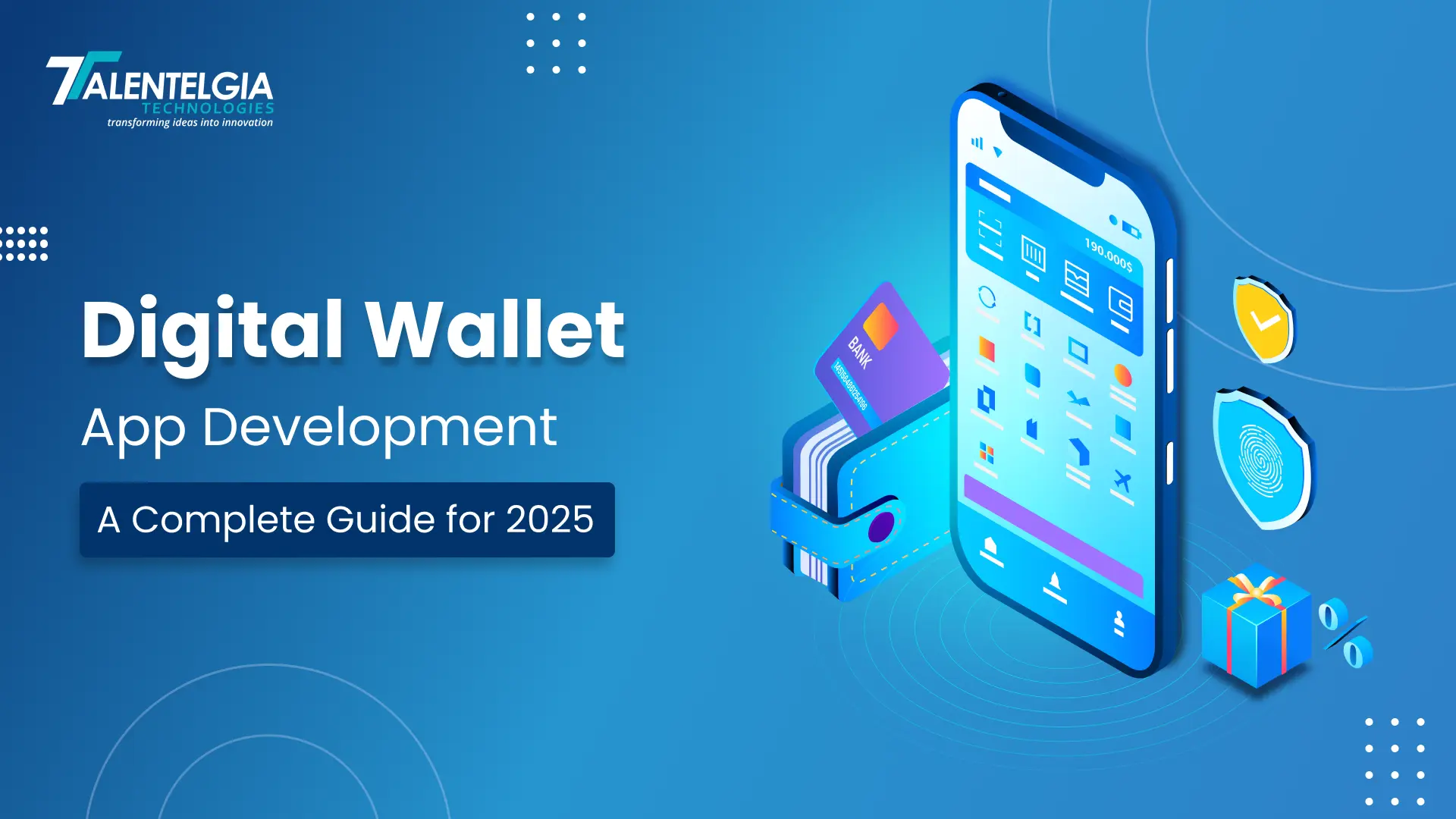Almost everyone enjoys watching sports. It is terrific seeing world-class athletes tackle new challenges every game. But for many, the real thrill lies not just in watching, but getting involved, and potentially cashing out as well! This craving for deeper engagement has given rise to the most common forms of sports entertainment— fantasy sports. It allows participants to form their own teams and score points based on the statistics generated in real games.
Building a fantasy sports app is incredibly profitable. New apps seem to appear across popular sports (cricket, football, basketball, kabbaddi, baseball, hockey) almost every week. As per the Business Research Company report, the market size of fantasy sports was $30.83 billion in 2024, which is projected to grow by $58.5 billion by 2029 with a CAGR of 14.5% during the forecast period (2024 – 2029). These trends highlight just how enormous the potential is for fantasy sports app development, enticing countless startups and established companies to try their luck.
Yet, success is not without its hurdles— competition is fierce, legal landscapes are evolving, and technology keeps advancing. This post will cover the most important things for people who want to start in the fantasy sports app development industry. So let’a begin!
Understanding Fantasy App Development Cost: A Detailed Overview
Online casino games and other fantasy sports platforms are one of the fastest-growing segments in the sports betting industry, with fantasy sports apps gaining a massive user base across popular sports like basketball, football, badminton, cricket, etc. This surge has sparked a significant demand for fantasy sports app development.
Leading the charge are top brands such as DraftKings, FanDuel, Dream11, MPL, and ESPN Fantasy, setting industry benchmarks and breaking records. These apps offer users thrilling gameplay experiences and exciting opportunities to win rewards. Thus, this is the right time to bring their dream fantasy sports app to life and quickly establish their presence in this booming market.
What Is a Fantasy Sports App?
A fantasy sports app is your personal arena for building, managing, and competing with virtual teams based on real-world athletic events. Users draft real players, form squads, and enter leagues or contests—earning points as their picks perform in actual games. What sets these platforms apart is their blend of skill, excitement, and strategy, letting everyday fans act like team managers, track live stats, and climb leaderboards all from their phone or computer.
Modern fantasy sports apps go beyond single-sport picks—they’ll let you play cricket, football, basketball, and more, sometimes even simultaneously. From lightning-fast daily contests to season-long showdowns, today’s platforms are packed with features like live scoring, instant chat, customizable squads, social referrals, and secure payments, making every user experience both thrilling and seamless.
Some of the most well-known fantasy sports apps globally include Dream11, ESPN Fantasy Sports, MyTeam11, and Yahoo Fantasy Sports — each offering unique formats, contests, and experiences for players around the world.
Why Build a Fantasy Sports App In 2025?
The fantasy gaming industry is booming, showing no signs of slowing down. Here’s why 2025 is the ultimate time to launch:
- Surging Global Demand: Millions of sports fans now play fantasy games regularly, driving market growth and creating a massive user base.
- Unmatched Engagement: Users are glued to their screens for draft nights, live matches, and real-time banter, ensuring sky-high retention.
- Diverse Revenue Streams: Monetize through contest fees, ads, in-app purchases, and premium league upgrades for a profitable platform.
- Tech Innovation: Latest trends like AI-driven recommendations, blockchain-powered transparency, immersive AR/VR, and smart gamification help you leapfrog competitors and deliver next-level fantasy action.
- Community & Brand Loyalty: Fantasy leagues turn casual fans into lifelong brand advocates, fueling viral growth through referrals and social play.
Fantasy sports apps in 2025 are not just digital games—they’re global communities, dynamic data engines, and powerful brand-building tools rolled into one. Building one now gives you a front-row ticket to sports tech’s most exciting era.

Key Factors Influencing Fantasy Sports App Development Cost: Full Price Breakdown
Building a fantasy sports app in 2025 is like assembling an all-star team—every position, every play, and every strategic decision has a direct impact on your final budget. Below, you’ll find a detailed, high-energy breakdown of the top cost drivers that can make or break your fantasy app project. If you want to win big in the fast-paced world of digital sports, pay close attention to each of these power plays!
1. App Complexity & Feature Power-Ups
Building your fantasy app is like creating a championship squad—the more star players (features) you draft, the bigger your budget needs to be! Essentials such as user registration, team drafting, live scoring, and contests form the MVP. Once you start adding AI analytics, multi-sport support, real-time chats, and social feeds, the game changes and costs climb higher.
The complexity escalates as you chase elite apps packed with VR, blockchain, seamless integrations, and robust admin controls—a true Hall-of-Fame in the fantasy world.
| App Type | Popular Sports Mode Example | Estimated Cost (USD) | Power Features |
| MVP/Basics | Fantasy cricket/football | $15,000–$50,000 | Registration, contests, basics |
| Mid-Range Pro | Multi-sport apps | $50,000–$120,000 | AI-driven picks, live stats, chat |
| Advanced/Elite | Cross-platform, feature-rich | $120,000–$250,000+ | AR/VR, blockchain, streaming, NFTs |
2. Platform Selection (Android, iOS, Web)
Choosing your app platform is like picking the league you want to play in. Developing for just iOS App Development or Android App Development is a solid start—cost-effective and focused. Want to hit both Android and iOS, or blast onto the Web?
That’s where Cross Platform App Development comes into play.
Multi-platform development means more code, more testing, and higher costs. Cross-platform frameworks like Flutter offer a decent hat-trick for teams on a budget, but won’t have every premium move of a native build.
| Platform Type | Description | Estimated Cost |
| Single Platform | Android or iOS Only | $25,000–$60,000 |
| Dual Platform | Android and iOS | $50,000–$120,000 |
| Cross-Platform | Hybrid, Flutter, React Native | $40,000–$80,000 |
| Web + Mobile | Web + Android/iOS | $70,000–$150,000 |
3. UI/UX Design: Fan Engagement
A fantasy app’s look and feel is the crowd’s first impression—a slick, intuitive design keeps fans cheering! Custom graphics, animated transitions, and seamless workflow aren’t just nice-to-haves; they boost retention and user hype. Still, every extra screen, custom avatar, or dynamic dashboard means higher design hours and tools.
| Design Level | Scope | Estimated Cost |
| Basic | Simple layout, limited screens | $4,000–$10,000 |
| Intermediate | Custom elements, smooth interactions | $10,000–$25,000 |
| Premium | Unique branding, advanced animation | $25,000–$50,000 |
4. Type of App Format
The format of your fantasy sports app is like picking your signature game type on the field. A season-long format lets users manage teams throughout an entire sports season, offering deeper engagement but higher development complexity. Daily Fantasy Sports are fast-paced and require nonstop contest updates and real-time scoring, which makes them more expensive. Multi-sport fantasy apps bundle several sports with their own rules, APIs, and user flows, multiplying development effort. Hybrid formats mix gaming elements like quizzes or card trading with fantasy play, pushing costs even higher.
Your app format dictates not only user excitement but also how much you invest in building scalable, smooth experiences.
| Format Type | Description | Estimated Cost |
| Season-Long | Long campaigns, complex scoring | $30,000–$80,000 |
| Daily Fantasy | Rapid contests, live updates, instant rewards | $40,000–$100,000 |
| Multi-Sport | Multiple sports, unique rules & data | $70,000–$200,000 |
| Hybrid/Advanced | Mix of fantasy with mini-games & trading | $100,000–$250,000+ |
5. Backend Infrastructure & Scalability Needs
The stronger the backend, the better the fantasy sports app. Since these apps depend heavily on real-time data processing, player stats, leaderboards, and live score updates, having a scalable cloud infrastructure—like AWS, Google Cloud, or Azure—is essential. Apps expected to support millions of concurrent users and frequent contests need key features such as load balancing, database optimization, and caching systems to prevent crashes and lag.
Plus, adding real-time chat, notifications, and instant payouts amps up backend complexity. Good scalability ensures your app grows smoothly, retains users, and performs like a champ through every match and tournament.
| Infrastructure Focus | Importance & Game-Changer | Typical Cost Range |
| Cloud Hosting (AWS, GCP, Azure) | Provides scalable power to handle peak loads during contests | $5,000–$20,000 |
| Load Balancing & Auto-Scaling | Keeps the app responsive during user spikes | $3,000–$10,000 |
| Database Optimization | Speedy data retrieval for live stats | $4,000–$12,000 |
| Caching Systems (Redis, Memcached) | Reduces server load and boosts response time | $2,000–$8,000 |
| Real-Time Communication (WebSockets, Firebase) | Ensures real-time scores, chats, and notifications | $4,000–$15,000 |
6. Team Location & Expertise
App development rates vary as much as sports salaries—top experts in Silicon Valley or London mean premium pricing, while talented squads in Eastern Europe or India score significant savings, especially for startups. More experienced teams may turn a concept into a global all-star, but their rates are higher.
| Region | Hourly Rate | Typical Cost for Full Project |
| USA/Europe | $80–$200/hr | $120,000–$250,000 |
| Eastern Europe | $40–$120/hr | $80,000–$180,000 |
| India/Southeast Asia | $15–$60/hr | $20,000–$80,000 |
7. Ongoing Maintenance/Security/Compliance
Launching your fantasy sports app is just the kickoff—the real game is in the ongoing maintenance. Regular upkeep ensures your app runs smoothly during live contests and peak traffic, preventing crashes and keeping fans glued to their screens. Maintenance includes performance tuning, bug fixes, server upgrades, and regular security patches to protect sensitive user data and payments. Compliance with legal regulations (like GDPR) and gaming laws is critical to avoid penalties and build user trust.
| Maintenance Focus | What It Covers | Monthly Cost Estimate |
| Server & Performance | Traffic handling, database tuning, and uptime | $1,000–$3,000 |
| Security & Data Protection | Patches, firewalls, and compliance with laws | $1,000–$3,000 |
| API & Data Feed Stability | Real-time scoring accuracy, fallback feeds | $700–$2,000 |
| UI/UX Updates | Bug fixes, navigation, new features | $800–$2,500 |
| Payment System Maintenance | Secure transactions, payment gateway updates | $600–$1,500 |
Tips To Reduce The Overall Cost of Fantasy Sports App Development
Building your fantasy sports app doesn’t have to break the bank! With innovative strategies, you can keep costs in check while still aiming for a winning season.
- Start Small with an MVP: Launch with just the core features—user registration, team creation, scoring, and basic contests. This MVP approach lets you test the field without exhausting your budget, then add flashy features like AI analyses or AR/VR tech later when you know what fans crave.
- Go Cross-Platform: Use frameworks like Flutter or React Native to develop one app that works on both Android and iOS. This saves 30-40% of costs compared to building separate native apps, without losing the user experience edge.
- Outsource Smartly: Hire skilled developers in cost-effective regions like India or Southeast Asia. You get quality talent for $20–$80/hour rather than $100–$200/hour in the US or Europe, keeping your project lean and efficient.
- Reuse APIs and Modules: Don’t reinvent the wheel—integrate ready-made APIs for live scores, payments, authentication, and push notifications. This cuts down development time and cost significantly.
- Plan Scalable Architecture Early: Investing in cloud-based, scalable backend infrastructure saves expensive redesigns later. Platforms like AWS or Google Cloud make sure you’re ready for sudden fan surges during playoffs without crashing.
- Keep Design Simple but Slick: Focus on creating an intuitive and fast user experience over complex animations. Fans appreciate ease of use and speed, which hold the crowd better than flashy visuals.
- Choose the Right Development Partner: An experienced fantasy sports app developer can guide you through the process, help avoid costly mistakes, and deliver a product that scores from Day 1.
Final Words
Building a fantasy sports app in 2025 means entering an electrifying market packed with mega-monetization, tech revolutions, and fans hungry for new ways to play. Whether you’re dreaming of the next jackpot winner or just looking to score in your local league, smart budgeting, bold features, and fan-first experiences are your keys to the winner’s circle.
So, huddle up Contact us to deploy our dev team, pick your features like a fantasy draft, and make every penny.


 Healthcare App Development Services
Healthcare App Development Services
 Real Estate Web Development Services
Real Estate Web Development Services
 E-Commerce App Development Services
E-Commerce App Development Services E-Commerce Web Development Services
E-Commerce Web Development Services Blockchain E-commerce Development Company
Blockchain E-commerce Development Company
 Fintech App Development Services
Fintech App Development Services Fintech Web Development
Fintech Web Development Blockchain Fintech Development Company
Blockchain Fintech Development Company
 E-Learning App Development Services
E-Learning App Development Services
 Restaurant App Development Company
Restaurant App Development Company
 Mobile Game Development Company
Mobile Game Development Company
 Travel App Development Company
Travel App Development Company
 Automotive Web Design
Automotive Web Design
 AI Traffic Management System
AI Traffic Management System
 AI Inventory Management Software
AI Inventory Management Software
 AI Software Development
AI Software Development  AI Development Company
AI Development Company  AI App Development Services
AI App Development Services  ChatGPT integration services
ChatGPT integration services  AI Integration Services
AI Integration Services  Generative AI Development Services
Generative AI Development Services  Natural Language Processing Company
Natural Language Processing Company Machine Learning Development
Machine Learning Development  Machine learning consulting services
Machine learning consulting services  Blockchain Development
Blockchain Development  Blockchain Software Development
Blockchain Software Development  Smart Contract Development Company
Smart Contract Development Company  NFT Marketplace Development Services
NFT Marketplace Development Services  Asset Tokenization Company
Asset Tokenization Company DeFi Wallet Development Company
DeFi Wallet Development Company Mobile App Development
Mobile App Development  IOS App Development
IOS App Development  Android App Development
Android App Development  Cross-Platform App Development
Cross-Platform App Development  Augmented Reality (AR) App Development
Augmented Reality (AR) App Development  Virtual Reality (VR) App Development
Virtual Reality (VR) App Development  Web App Development
Web App Development  SaaS App Development
SaaS App Development Flutter
Flutter  React Native
React Native  Swift (IOS)
Swift (IOS)  Kotlin (Android)
Kotlin (Android)  Mean Stack Development
Mean Stack Development  AngularJS Development
AngularJS Development  MongoDB Development
MongoDB Development  Nodejs Development
Nodejs Development  Database Development
Database Development Ruby on Rails Development
Ruby on Rails Development Expressjs Development
Expressjs Development  Full Stack Development
Full Stack Development  Web Development Services
Web Development Services  Laravel Development
Laravel Development  LAMP Development
LAMP Development  Custom PHP Development
Custom PHP Development  .Net Development
.Net Development  User Experience Design Services
User Experience Design Services  User Interface Design Services
User Interface Design Services  Automated Testing
Automated Testing  Manual Testing
Manual Testing  Digital Marketing Services
Digital Marketing Services 
 Ride-Sharing And Taxi Services
Ride-Sharing And Taxi Services Food Delivery Services
Food Delivery Services Grocery Delivery Services
Grocery Delivery Services Transportation And Logistics
Transportation And Logistics Car Wash App
Car Wash App Home Services App
Home Services App ERP Development Services
ERP Development Services CMS Development Services
CMS Development Services LMS Development
LMS Development CRM Development
CRM Development DevOps Development Services
DevOps Development Services AI Business Solutions
AI Business Solutions AI Cloud Solutions
AI Cloud Solutions AI Chatbot Development
AI Chatbot Development API Development
API Development Blockchain Product Development
Blockchain Product Development Cryptocurrency Wallet Development
Cryptocurrency Wallet Development About Talentelgia
About Talentelgia  Our Team
Our Team  Our Culture
Our Culture 
 Healthcare App Development Services
Healthcare App Development Services Real Estate Web Development Services
Real Estate Web Development Services E-Commerce App Development Services
E-Commerce App Development Services E-Commerce Web Development Services
E-Commerce Web Development Services Blockchain E-commerce
Development Company
Blockchain E-commerce
Development Company Fintech App Development Services
Fintech App Development Services Finance Web Development
Finance Web Development Blockchain Fintech
Development Company
Blockchain Fintech
Development Company E-Learning App Development Services
E-Learning App Development Services Restaurant App Development Company
Restaurant App Development Company Mobile Game Development Company
Mobile Game Development Company Travel App Development Company
Travel App Development Company Automotive Web Design
Automotive Web Design AI Traffic Management System
AI Traffic Management System AI Inventory Management Software
AI Inventory Management Software AI Software Development
AI Software Development AI Development Company
AI Development Company ChatGPT integration services
ChatGPT integration services AI Integration Services
AI Integration Services Machine Learning Development
Machine Learning Development Machine learning consulting services
Machine learning consulting services Blockchain Development
Blockchain Development Blockchain Software Development
Blockchain Software Development Smart contract development company
Smart contract development company NFT marketplace development services
NFT marketplace development services IOS App Development
IOS App Development Android App Development
Android App Development Cross-Platform App Development
Cross-Platform App Development Augmented Reality (AR) App
Development
Augmented Reality (AR) App
Development Virtual Reality (VR) App Development
Virtual Reality (VR) App Development Web App Development
Web App Development Flutter
Flutter React
Native
React
Native Swift
(IOS)
Swift
(IOS) Kotlin (Android)
Kotlin (Android) MEAN Stack Development
MEAN Stack Development AngularJS Development
AngularJS Development MongoDB Development
MongoDB Development Nodejs Development
Nodejs Development Database development services
Database development services Ruby on Rails Development services
Ruby on Rails Development services Expressjs Development
Expressjs Development Full Stack Development
Full Stack Development Web Development Services
Web Development Services Laravel Development
Laravel Development LAMP
Development
LAMP
Development Custom PHP Development
Custom PHP Development User Experience Design Services
User Experience Design Services User Interface Design Services
User Interface Design Services Automated Testing
Automated Testing Manual
Testing
Manual
Testing About Talentelgia
About Talentelgia Our Team
Our Team Our Culture
Our Culture















 Write us on:
Write us on:  Business queries:
Business queries:  HR:
HR: 





